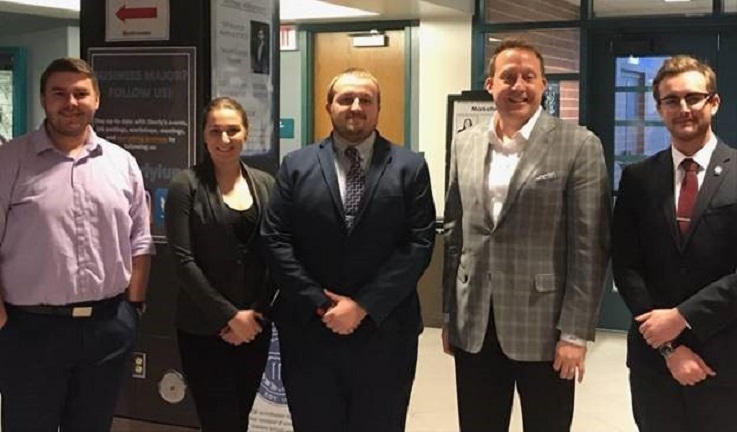On February 25, 2018, James Leda ’95 spent the day sharing his expertise and advice with students in the IUP Eberly College of Business and Information Technology.
Leda gave a presentation to Daniel Lawson’s Finance Seminar class (FIN422). Jim is a managing director at KRyS Global USA. His specialty is working with distressed companies that have filed for bankruptcy or have a high-probability of filing or their creditors (those who are owed money).
Leda highlighted different points of bankruptcy, including the differences in chapter 7 and chapter 11 filings. In the case of chapter 7, the company is liquidated, the business ceases to exist, and assets from the sale are distributed to the different levels of debt and equity. Value is returned to the debt and equity holders through negotiations and, if needed, litigation. Chapter 11 bankruptcy results in a plan of reorganization and commences with the entity obtaining court-ordered relief from its creditors. This allows the entity to trim unnecessary operations and stabilize itself. Chapter 11 restructuring can include a balance sheet restructuring, operational restructuring, or both.

Leda referenced a professor of finance at NYU-Stern, Edward Altman, who in 1968 developed a model to predict an organization’s likelihood of bankruptcy. The formula assigns a coefficient to certain ratios of a company to come up with an overall score. A score above 3 indicates solvency, approximately 1.8 and below indicates a high probability of filing, and in-between is the “gray area.” Leda explained how this model is a widely recognized model for measuring a company’s financial health.
The students had the opportunity to participate in a simulated valuation conflict where half the class acted on the behalf of unsecured bond holders and the other half acted on the behalf of subordinated bond holders. The purpose of this activity was to apply different financial knowledge and valuation skills to argue which valuation model was correct and how it should be changed to reflect the interest of each set of bondholders. Leda explained how this sort of conflict resolution happens every day and those who succeed most have a deep understanding of finance, accounting, as well as the ability to think creatively.

Colton Kensinger, a senior finance student, summarized, “Mr. Leda provided insight into a unique area of finance that deals with high level bankruptcy cases. He gave us the opportunity to use a culmination of our finance skills to argue a valuation model.”
In addition to speaking in the Finance Seminar Speaker Series, James Leda held a Coffee Hour to chat with Eberly students and spoke with the Student Accounting Association in the evening.